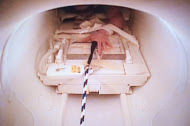Researchers crack case on age-old arthritis myth

Courtesy UNIVERSITY OF ALBERTA
Researchers at the University of Alberta used an MRI machine to discover the audible “knuckle cracking” sound is caused by air bubbles forming in the synovial fluid.
May 1, 2015
Of all the white lies parents tell their children, one of the most widespread is that knuckle-cracking can cause arthritis. However, new research at the University of Alberta has disproved this myth and discovered what the “cracking” sound actually is.
Researchers examined joints in each finger being cracked through a high-power MRI machine in a study titled “Real-Time Visualization of Joint Cavitation,” published in the April 15 edition of the journal PLOS One. Researchers discovered that the sound omitted when one cracks his or her knuckles is actually the sound of a bubble forming in the joint’s synovial fluid rather than a bubble popping, according to Richard Thompson, co-author of the study and an associate professor of biomedical engineering at the University of Alberta.
“Previously, it was thought that the knuckle crack was popping the bubbles,” Thompson said. “Before there was a knuckle crack, the distance between the bones at the knuckle was slowly growing. [When the knuckle cracked,] we could see a black signal void form in the fluid between the joints, so that’s the formation of a bubble. It’s a shift in the explanation of what causes the actual cracking sound in knuckle cracking.”
English researchers first hypothesized in the 1947 study “Cracking in the metacarpo-phalangeal joint” that the cracking sound was the formation of a space for gas bubbles in the joint fluid. However, studies in the 1970s, such as “The Consequences of Habitual Knuckle Cracking” theorized that the gas bubbles bursting caused the noise. Although no scientific study was found to prove a correlation between frequent knuckle cracking and arthritis, a 1990 study titled “Effect of habitual knuckle cracking on hand function” found frequent knuckle cracking can lead to hand swelling, reduced grip strength and decreased hand function.
“It’s neither harmful nor good for your joints, but it’s psychologically soothing to do it,” said Calvin R. Brown Jr., an associate professor of rheumatology at Northwestern University’s Feinberg School of Medicine. “Cracking your knuckles makes your parents crazy, but that’s about it.”
The MRI also revealed that before the knuckle actually cracks, a vacuum is created in the fluid that pulls oxygen and other gases into the joint, which results in the bubble forming and subsequently making the “cracking” sound.
“When you’re pulling your joint, you’re creating a vacuum for negative pressure in between there,” Thompson said. “It [will be] exciting in the future to study this more [and] to think we’re imaging the predecessor of the knuckle-crack. It’s a sort of mechanistic-finding.”
The study used a single subject who could crack his knuckles repeatedly—co-author Jerome Fryer, a chiropractor in British Columbia.
“He’s very interested in this phenomenon, so he volunteered,” Thompson said. “He’s a great knuckle-cracker and could crack his knuckles on demand.”
Researchers were surprised at how clear the results of the study were, Thompson said.
“We didn’t think it was going to be such a clear, easy-to-visualize event,” Thompson said. “We were really excited when we first saw it happen and the fact that we could repeat it on every attempt to make the knuckle crack made us confident that what we were observing was a real phenomenon.”
The technology used in the study and the discovery were both novel, according to Brown.
“It’s a really interesting study,” Brown said. “We really did think that [the cracking sound] was due to gas bubbles, so we were close. This study shows, with this advancement in MRI technology, the cracking isn’t the bubble cracking.”
Rheumatologists and other members of the medical community have known habitual knuckle-cracking could not cause arthritis or other long-term medical conditions for nearly 40 years, according to Brown.
“Your parents don’t like the sounds of your knuckles cracking, so they tell you it causes arthritis because they want you to stop doing it,” Brown said. “There’s absolutely nothing wrong with it. It doesn’t make you healthier, but it does give you a degree of satisfaction.”







